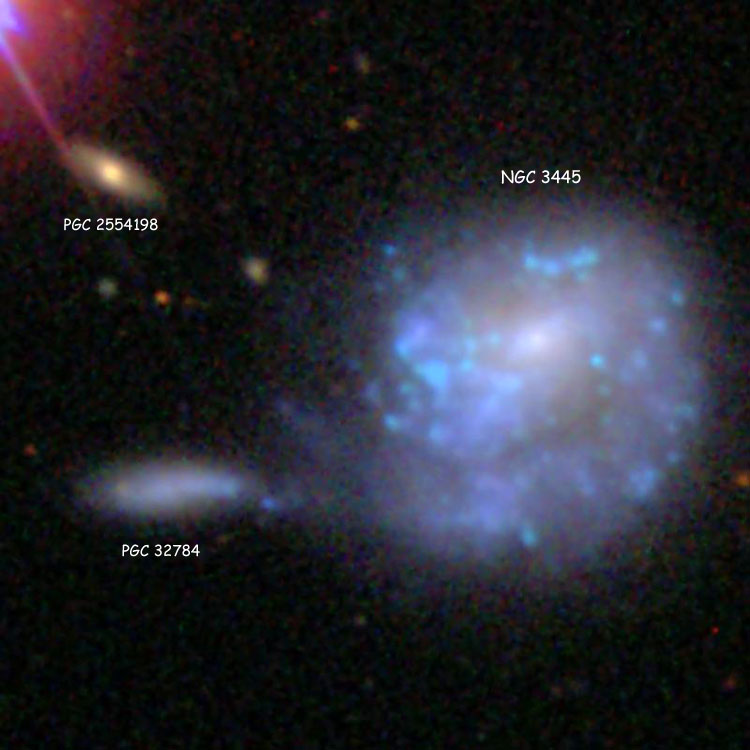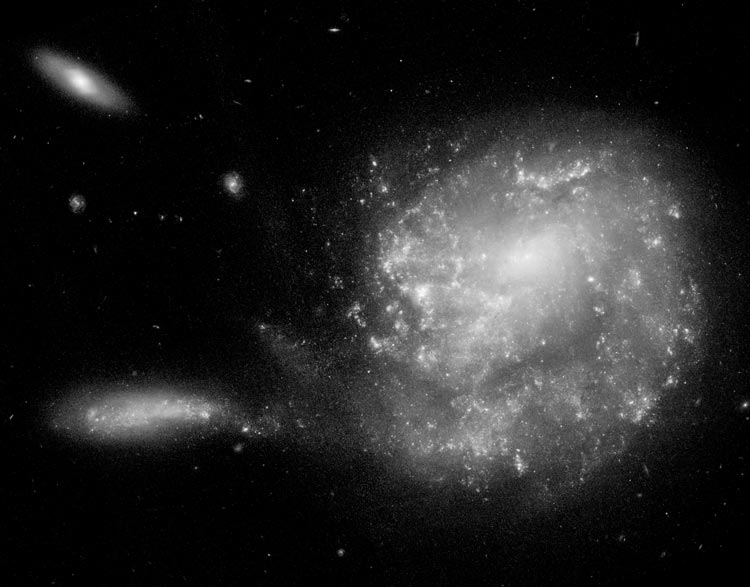|
The original Principal Galaxies Catalog contained 73,197 entries. Subsequent revisions have increased this to more than three million entries. I have no intention of covering all of those entries on this site, but there needs to be a place to list or discuss (if needed) any PGC entries referred to elsewhere, so this page (or if it grows too large some group of pages based on this page) will eventually discuss all such entries with PGC designations of 2,000,000 to 2,999,999.
Page last updated May 21, 2021
PGC 2018395
An 18th-(B)magnitude galaxy (type ?) in Andromeda (RA 00 10 54, Dec +32 56 57)
Listed in NED as 2MASXJ00105430+3256572
Apparent size 0.25 by 0.2 arcmin; nothing else available

Above, a 1.2 arcmin wide closeup of PGC 2018395
Also shown in wide-field view of PGC 2019088 and NGC 19
PGC 2087677 (probably a physical companion of NGC 4774)
A magnitude 16.5(?) galaxy (type Sbc? pec) in Canes Venatici (RA 12 53 06.0, Dec +36 49 35)
For anything else see this entry
PGC 2184190
(Due to work on unknown page -- presumably obvious if do wide-field image)

PGC 2184380
(Due to work on unknown page -- presumably obvious if do wide-field image)

PGC 2018931
An 18th-(B)magnitude galaxy (type ?) in Andromeda (RA 00 11 18, Dec +32 57 53)
Listed in NED as 2MASXJ00111798+3257534
Apparent size 0.3 by 0.2 arcmin; nothing else available

Above, a 1.2 arcmin wide closeup of PGC 2018931
Also shown in wide-field view of PGC 2019088
PGC 2019088
A 17th-(B)magnitude galaxy (type ?) in Andromeda (RA 00 10 57, Dec +32 58 11)
Listed in NED as 2MASXJ00105708+3258112
Apparent size 0.35 by 0.2; nothing else available

Above, a 1.2 arcmin wide closeup of PGC 2019088
Below, a 12 arcmin wide region centered on the galaxy
Also shown are NGC 19, PGC 2018395, 2018931 and 2019785

PGC 2019785
An 18th-(B)magnitude galaxy (type ?) in Andromeda (RA 00 10 56, Dec +32 59 22)
Not listed in NED. Apparent size 0.5 by 0.2 arcmin; nothing else available

Above, a 1.2 arcmin wide closeup of PGC 2019785
Shown in wide-field view of PGC 2019088 and NGC 19
PGC 2022467
An 18th-(B)magnitude galaxy (type ?) in Andromeda (RA 00 10 41, Dec +33 04 25)
Listed in NED as 2MASXJ00104062+3304251
Apparent size 0.35 by 0.25 arcmin; nothing else available

Above, a 1.2 arcmin wide closeup of PGC 2022467; also see wide-field view of NGC 19
PGC 2026460 (= PGC 2026461)
A 17th-(B)magnitude galaxy (type ?) in Andromeda (RA 00 09 43, Dec +33 12 37)
Listed in NED as 2MASXJ00094316+3312371
Apparent size 0.3 by 0.25 arcmin; nothing else available

Above, a 2.4 arcmin wide closeup of PGC 2026460; also see wide-field view of NGC 20
PGC 2027085 (= PGC 2027086)
A 17th-(B)magnitude galaxy (type S?) in Andromeda (RA 00 09 26, Dec +33 14 00)
Listed in NED as 2MASXJ00092569+3313599
Apparent size 0.4 by 0.25 arcmin; nothing else available

Above, a 2.4 arcmin wide closeup of PGC 2027085; also see wide-field view of NGC 20
PGC 2027809
An 18th-(B)magnitude galaxy (type S?) in Andromeda (RA 00 11 06, Dec +33 15 38)
Listed in NED as 2MASXJ00110586+3315382
Apparent size 0.45 by 0.2 arcmin; nothing else available

Above, a 2.4 arcmin wide closeup of PGC 2027809; also see wide-field view of NGC 29
PGC 2030408
Listed in NED as SDSS J085240.62+332151.6
A 16th-(B)magnitude galaxy (type Sb?) in Lynx (RA 08 52 41, Dec +33 21 52)
Based on recessional velocity of 18370 km/sec, about 800 million light years away. Given that and apparent size of 0.8 by 0.25 arcmin, about 200 thousand light years across. Note: Wikisky does not recognize the PGC number. Use the coordinates to search for the galaxy. 
Above, a 2.4 arcmin wide closeup of PGC 2030408; also see wide-field view of NGC 2683
PGC 2032797
Listed in NED as SDSS J085216.11+332824.3
A 17th-(B)magnitude galaxy (type S?) in Lynx (RA 08 52 16, Dec +33 28 34)Based on recessional velocity of 12835 km/sec, about 600 million light years away. Given that and apparent size of 0.4 by 0.2 arcmin, about 65 thousand light years across. Note: Wikisky does not recognize the PGC number. Use the coordinates to search for the galaxy. 
Above, a 2.4 arcmin wide closeup of PGC 2032797; also see wide-field view of NGC 2683
PGC 2100845 = PGC 2100846
An 18th-magnitude spiral galaxy in Pisces (RA 00 08 12, Dec +37 26 31)
Apparent size 0.4 by 0.2 arcmins; nothing else available

Above, a 1.2 arcmin wide closeup of PGC 2100845
PGC 2239251
A 17th-(B)magnitude galaxy (type ?) in Lynx (RA 09 15 51, Dec +44 12 49)Listed in NED as SDSSJ091551.05+441249.2. Based on recessional velocity of 9640 km/sec, about 430 million light years away. Given that and apparent size of 0.3 by 0.2 arcmin, about 40 thousand light years across.

Above, a 2.4 arcmin wide closeup of PGC 2239251; for wide-field view, see PGC 26124
PGC 2242096
An 18th-(B)magnitude galaxy (type ?) in Lynx (RA 09 16 00, Dec +44 20 35)
Listed in NED as SDSSJ091559.93+442034.6. Apparent size 0.45 by 0.2 arcmin; nothing else available

Above, a 2.4 arcmin wide closeup of PGC 2242096
Also shown are PGC Objects 26132, 82353, and 3098124 (See PGC 26132 for wide-field view)
PGC 2242434
A 17th-(B)magnitude galaxy (type BlueCG) in Lynx (RA 09 15 46, Dec +44 21 25)Listed in NED as SDSS J091545.81+442124.3. Based on recessional velocity of 11775 km/sec, about 525 million light years away. Given that and apparent size of 0.3 by 0.1 arcmin, about 45 thousand light years across.

Above, a 2.4 arcmin wide closeup of PGC 2242434; for wide-field view, see PGC 26132
PGC 2554198
A magnitude 17(?) spiral galaxy (type Sa?) in Ursa Major (RA 10 54 45.5, Dec +56 59 59)
Physical Information: Based on a recessional velocity relative to the Cosmic Background Radiation of 14430 km/sec (and H0 = 70 km/sec/Mpc), a straightforward calculation indicates that PGC 2554198 is about 670 to 675 million light-years away. However, for objects at such distances we should take into account the expansion of the Universe during the time it took their light to reach us. Doing that shows that the galaxy was about 635 million light-years away at the time the light by which we see it was emitted, about 650 million years ago (the difference between the two numbers being due to the expansion of the intervening space during the light-travel time). Given that and its apparent size of about 0.4 by 0.1 arcmin (from the images below), the galaxy is about 70 to 75 thousand light-years across.
Note About Classification: The images of PGC 2554198 (below) do not make it clear whether it is a spiral or lenticular galaxy, but it has an "active" nucleus, making it far more likely to be a spiral (as suggested in LEDA), and assuming that, its appearance is more consistent with a better "organized" spiral, such as type Sa, than a more diffuse one, such as type Sc. Still, its image has too little detail to be sure of its type, hence the question mark added to its presumed classification.

Above, a 12 arcmin wide SDSS image centered on NGC 3445, also showing PGC 32784 and PGC 2554198
Below, a 2.4 arcmin wide SDSS image of the three galaxies

Below, a 2.3 by 1.8 arcmin wide image of the three galaxies (Image Credit Hubble Legacy Archive, Judy Schmidt)

Below, a 0.5 arcmin wide image of PGC 2554198 (Image Credit as above)

PGC 2714500
An 11th-magnitude star in Camelopardalis (RA 03 48 39.8, Dec +68 14 04)

Above, a 12 arcmin wide region centered on the supposed PGC object
The glow at lower right is the northeastern rim of IC 342
PGC 2802352 (with PGC 52803 = Arp 47)
PGC 2819260 (= 4C+15.03)
A radio source in ? (RA 00 23 35, Dec +15 44 36)
No visible object exists at the location, but a number of very faint galaxies lie near it

Above, an extreme contrast 2.4 arcmin wide SDSS view centered on the position (indicated by a + sign)
Below, a more normal contrast 12 arcmin wide view centered on the position

PGC 2923327 (= NGC 40)
A magnitude 12.3 planetary nebula in Cepheus (RA 00 13 01.0, Dec +72 31 19)
(See NGC 40 for anything else.)
|